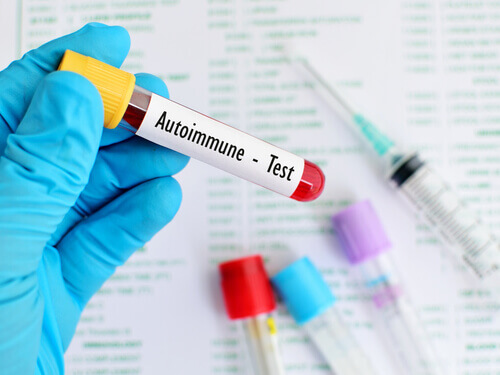7 Signs of High Cortisol Levels in Your Body

Cortisol or hydrocortisone is a hormone that the adrenal gland produces. It increases blood sugar levels and can decrease bone formation and can cause some diseases such as excess overweight. Increased cortisol levels are known as “hypercortisolism” or Cushing’s syndrome.
This syndrome leads to body stress and a concentration of fat and elevated blood pressure levels and heart rate. In addition, recent research demonstrates that the incidence of acute myocardial infarction in the morning due to the joint action of endogenous factors because of an increase in cortisol.
As you can see, there are various signals that the body emits when it has a hormonal imbalance like this. Keep reading and discover other symptoms that we’ll talk about below.
Possible signs of high cortisol
Although these symptoms aren’t present in all cases, there are some of the signs that something isn’t right in your body and that you may have high cortisol levels. Do you want to know what they are? Keep reading!
1. Sudden weight gain

Weight gain is one of the first symptoms of high cortisol. More so, it’s especially noticeable in the upper part of the body, since fat begins to accumulate in places like the shoulders, chest, and back.
The strangest thing about this is that the arms and legs of this person will continue to be thin.
Studies show that elevated cortisol reduces blood flow and glucose supply to the brain. This interferes with the ability of brain cells to absorb glucose and can even lead to neuronal death.
Interestingly, in a study titled “Fructose-induced inflammation and increased cortisol: A new mechanism for how sugar induces visceral adiposity,” experts observed that fructose in the brain stimulates increased cortisol release, which could lead to general insulin resistance and weight gain.
Read: How Hormones Can Affect Your Weight
2. Skin symptoms
Hypercortisolism or Cushing’s syndrome also affects the skin. In fact, a person can have the following skin symptoms:
- Acne
- Bruising
- Increased facial and body hair
- Purple lesions on the breasts, abdomen, and thighs
3. Musculoskeletal and bone symptoms
In addition, high cortisol can also affect the muscles and bones. In other words, the bone structure becomes weak and this leads to an increased risk of fractures, especially in the ribs and spine. Also, there’s an increased risk of muscle tears and related injuries.
4. Immune system deficiencies

The thymus gland, which regulates the human immune system, is also affected by high cortisol. High cortisol can cause the death of cells and make the immune system attack the tissues of the body instead of viruses.
- The most common symptoms of an immune system failure are asthma and allergies.
- However, the problem may become even more serious: it may cause lupus, Crohn’s disease, or fibromyalgia.
5. Mood swings and mood disorders
Anxiety is one of the most common symptoms that usually appear when someone is under a lot of stress. This is accompanied by continuous and sudden mood swings throughout the day. In some cases, signs of serious depression can manifest.
6. Fatigue and insomnia
Dr. Hernando Pérez Díaz, coordinator of the Sleep and Wake Disorders Study Group of the Spanish Neurology Society (SEN) explained the following regarding sleep and hormonal activity:
“The main function of sleep is rest – as do the theories of tissue repair through the secretion of anabolic hormones (GH, prolactin, testosterone, and LH), and the suppression of catabolic hormones (cortisol), energy conservation or maintenance of synapses and the integrity of the neural network.”
The energy cortisol provides can be counterproductive for the body. The body doesn’t rest if it’s overly active during the day. At night, excess cortisol doesn’t allow the person to rest and, therefore, suffers from insomnia.
- Under normal conditions, cortisol spikes around 8:00 a.m. to provide the body with energy.
- However, active hypercortisolism causes the opposite effect. The person is activated at night and is exhausted in the morning.
7. Digestive disorders
Another study explains the relationship between stress and prolonged high levels of cortisol, which eventually produces bodily symptoms, among which the digestive symptoms stand out. The most common that can be triggered is irritable bowel syndrome, with episodes of diarrhea or constipation, ulcers, indigestion, and abdominal pain, among others.
How to balance the cortisol levels in the body?
Below, we’ll share some tips for decreasing cortisol levels in the body so that you can lead a healthier life.
Try to sleep more
Be mindful of your sleep hygiene, maintain a good sleep routine, perform relaxation rituals before bed, have light dinners preferably at least three hours before bed, and try to do everything you can to get a good night’s sleep. Find the ritual you like the most and practice it every day.
Keep in mind that, besides reducing cortisol levels, enjoying a good night’s rest will allow you to look younger and be healthier.
Keep your sugar levels stable
Keep a balanced diet, rich in nutritious food, and avoid fizzy and sugary drinks, and processed and frozen foods. Eat fruit daily, and prepare complete meals comprised of carbohydrates, protein, and fiber, in order to control your sugar levels.
It’s also recommended that you take supplements like vitamin B, calcium, magnesium, chromium, zinc, vitamin C, and alpha-lipoic acid (ALA).
Say goodbye to coffee

Caffeine tends to increase blood cortisol levels by at least 30% within an hour. However, in some cases, the effects can last for 18 hours. If your intention is to lower your catabolic metabolism and increase your anabolic metabolism, don’t drink more coffee.
Exercise
The known benefits of having a regular exercise routine, like gaining muscle mass and increasing the production of serotonin and dopamine, will lower the risk of developing anxiety or depression. Not only that, but you’ll avoid an imbalance in your cortisol levels.
Do you believe you have high cortisol levels? Consult your doctor
If you think you have one or more of the symptoms mentioned above, consult your doctor and clear up any doubts. This way, you will be able to know if you have high cortisol levels or not and what you can do about it. If a blood test is indicated, keep in mind that normal values vary according to the time of the sample and the age ranges.
Of course, keep in mind that, in addition to following the treatment prescribed by your doctor, you must maintain a healthy and consistent lifestyle for your health and well-being.
All cited sources were thoroughly reviewed by our team to ensure their quality, reliability, currency, and validity. The bibliography of this article was considered reliable and of academic or scientific accuracy.
- Amasi-Hartoonian, N., Sforzini, L., Cattaneo, A., & Pariante, C. M. (2022). Cause or consequence? Understanding the role of cortisol in the increased inflammation observed in depression. Current Opinion in Endocrine and Metabolic Research, 24, 100356. https://www.ncbi.nlm.nih.gov/pmc/articles/PMC7612780/
- Çay, M. (2017). The Effect of Cortisol Level Increasing Due to Stress in Healthy Young Individuals on Dynamic and Static Balance Scores. Northern Clinics of Istanbul. https://pubmed.ncbi.nlm.nih.gov/30859159/
- Chen, Y., & Lyga, J. (2014). Brain-Skin Connection: Stress, Inflammation and Skin Aging. Inflammation & Allergy-Drug Targets, 13(3), 177-190. https://www.ncbi.nlm.nih.gov/pmc/articles/PMC4082169/
- Chiodini, I., Scillitani, A. (2008). Role of cortisol hypersecretion in the pathogenesis of osteoporosis. Recenti Prog Med, 99(6), 309-13. https://pubmed.ncbi.nlm.nih.gov/18710063/
- Choe, S. J., Kim, D., Kim, E. J., Ahn, J. S., Choi, E. J., Son, E. D., Lee, T. R., & Choi, E. H. (2018). Psychological Stress Deteriorates Skin Barrier Function by Activating 11β-Hydroxysteroid Dehydrogenase 1 and the HPA Axis. Scientific Reports, 8(1). https://www.ncbi.nlm.nih.gov/pmc/articles/PMC5910426/
- Cuevas, G. S. (2016). La ansiedad y el estrés, nuestros peores enemigos. La Mente es Maravillosa. Consultado el 28 de septiembre de 2023. https://lamenteesmaravillosa.com/la-ansiedad-estres-peores-enemigos/
- Dziurkowska, E., & Wesolowski, M. (2021). Cortisol as a Biomarker of Mental Disorder Severity. Journal of Clinical Medicine, 10(21), 5204. https://www.ncbi.nlm.nih.gov/pmc/articles/PMC8584322/
- DiNicolantonio, J. J., Mehta, V., Onkaramurthy, N., & O’Keefe, J. H. (2018). Fructose-induced inflammation and increased cortisol: A new mechanism for how sugar induces visceral adiposity. Progress in Cardiovascular Diseases, 61(1), 3-9. https://pubmed.ncbi.nlm.nih.gov/29225114/
- Hackett, R. A., Dal, Z., & Steptoe, A. (2020). The relationship between sleep problems and cortisol in people with type 2 diabetes. Psychoneuroendocrinology, 117. https://www.ncbi.nlm.nih.gov/pmc/articles/PMC7302424/
- Haddad, C., Courand, P. Y., Berge, C., Harbaoui, B., & Lantelme, P. (2021). Impact of cortisol on blood pressure and hypertension-mediated organ damage in hypertensive patients. Journal of Hypertension, 39(7), 1412-1420. https://pubmed.ncbi.nlm.nih.gov/33534343/
- Hertel, J., König, J., Homuth, G., Van der Auwera, S., Wittfeld, K., Pietzner, M., Kacprowski, T., Pfeiffer, L., Kretschmer, A., Waldenberger, M., Kastenmüller, G., Artati, A., Suhre, K., Adamski, J., Langner, S., Völker, U., Völzke, H., Nauck, M., Friedrich, N., & Grabe, H. J. (2017). Evidence for Stress-like Alterations in the HPA-Axis in Women Taking Oral Contraceptives. Scientific Reports, 7(1). https://www.nature.com/articles/s41598-017-13927-7
- Hewagalamulage, S., Lee, T., Clarke, I., & Henry, B. (2016). Stress, cortisol, and obesity: a role for cortisol responsiveness in identifying individuals prone to obesity. Domestic Animal Endocrinology, 56, S112-S120. https://pubmed.ncbi.nlm.nih.gov/27345309/
- Kamba, A., Daimon, M., Murakami, H., Otaka, H., Matsuki, K., Sato, E., Tanabe, J., Takayasu, S., Matsuhashi, Y., Yanagimachi, M., Terui, K., Kageyama, K., Tokuda, I., Takahashi, I., & Nakaji, S. (2016). Association between Higher Serum Cortisol Levels and Decreased Insulin Secretion in a General Population. PLOS ONE, 11(11), e0166077. https://www.ncbi.nlm.nih.gov/pmc/articles/PMC5115704/
- Jones, C., & Gwenin, C. (2020). Cortisol level dysregulation and its prevalence—Is it nature’s alarm clock? Physiological Reports, 8(24). https://pubmed.ncbi.nlm.nih.gov/33340273/
- Lovallo, W. R., Whitsett, T. L., al’Absi, M., Sung, B. H., Vincent, A. S., & Wilson, M. F. (2005). Caffeine Stimulation of Cortisol Secretion Across the Waking Hours in Relation to Caffeine Intake Levels. Psychosomatic Medicine, 67(5), 734-739. https://www.ncbi.nlm.nih.gov/pmc/articles/PMC2257922/
- Lee, D. Y., Kim, E., & Choi, M. H. (2015). Technical and clinical aspects of cortisol as a biochemical marker of chronic stress. BMB Reports, 48(4), 209-216. https://www.ncbi.nlm.nih.gov/pmc/articles/PMC4436856/
- Paragliola, R. M., Corsello, A., Papi, G., Pontecorvi, A., & Corsello, S. M. (2021). Cushing’s Syndrome Effects on the Thyroid. International Journal of Molecular Sciences, 22(6), 3131. https://pubmed.ncbi.nlm.nih.gov/33808529/
- Peeters, G. M. E. E., van Schoor, N. M., van Rossum, E. F. C., Visser, M., & Lips, P. (2008). The relationship between cortisol, muscle mass and muscle strength in older persons and the role of genetic variations in the glucocorticoid receptor. Clinical Endocrinology, 69(4), 673-682. https://www.ncbi.nlm.nih.gov/pmc/articles/PMC7302424/
- Thau L, Gandhi J, Sharma S. Physiology, Cortisol. In: StatPearls [Internet]. Treasure Island (FL): StatPearls Publishing; 2022 Jan-. Available from: https://www.ncbi.nlm.nih.gov/books/NBK538239/
- Uwaifo GI, Hura DE. Hypercortisolism. [Updated 2022 Jul 4]. In: StatPearls [Internet]. Treasure Island (FL): StatPearls Publishing; 2022 Jan-. Available from: https://www.ncbi.nlm.nih.gov/books/NBK551526/
- Vargas, I., Vgontzas, A. N., Abelson, J. L., Faghih, R. T., Morales, K. H., & Perlis, M. L. (2018). Altered ultradian cortisol rhythmicity as a potential neurobiologic substrate for chronic insomnia. Sleep Medicine Reviews, 41, 234-243. https://pubmed.ncbi.nlm.nih.gov/29678398/
- Walter, K. N., Corwin, E. J., Ulbrecht, J., Demers, L. M., Bennett, J. M., Whetzel, C. A., & Klein, L. C. (2012). Elevated thyroid stimulating hormone is associated with elevated cortisol in healthy young men and women. Thyroid research, 5(1), 1-6. https://link.springer.com/article/10.1186/1756-6614-5-13
- Woldeamanuel, Y. W., Sanjanwala, B. M., & Cowan, R. P. (2020). Endogenous glucocorticoids may serve as biomarkers for migraine chronification. Therapeutic Advances in Chronic Disease, 11, 204062232093979. https://www.ncbi.nlm.nih.gov/pmc/articles/PMC7495027/
This text is provided for informational purposes only and does not replace consultation with a professional. If in doubt, consult your specialist.








